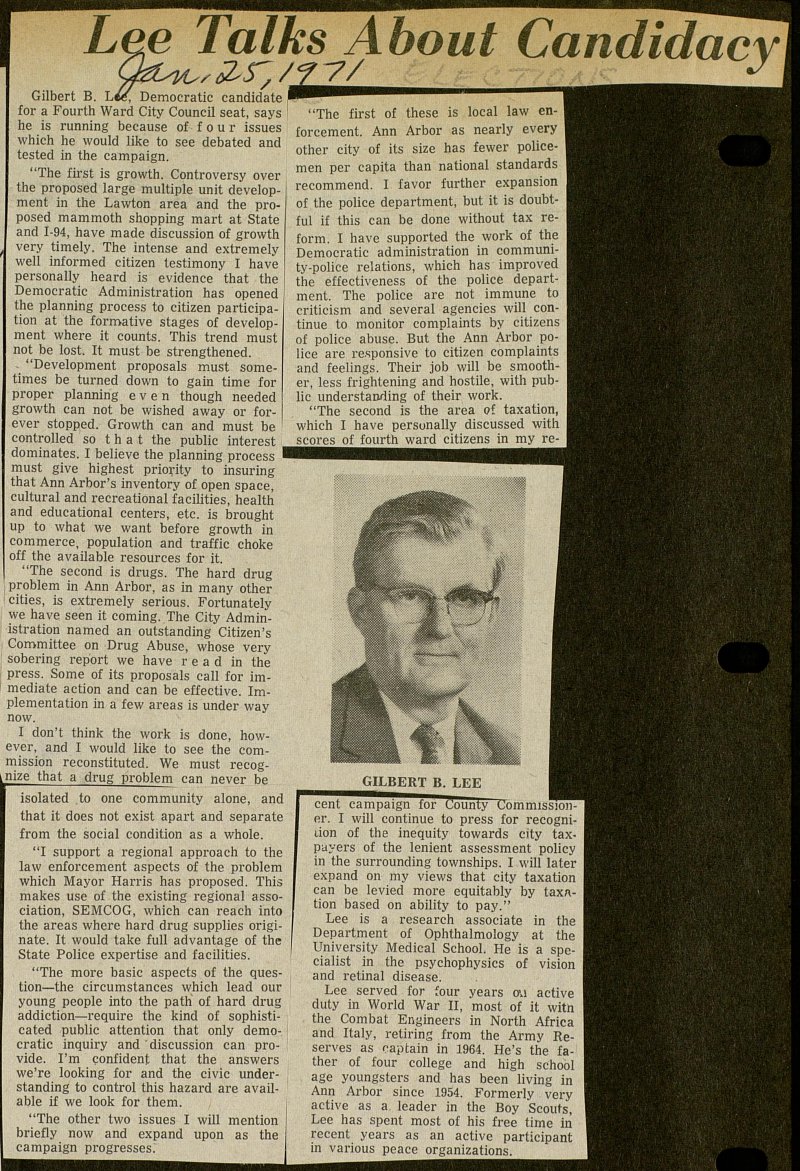Lee Talks About Candidacy

Gilbert B. Léf Democratie candidate for a Fourth Ward City Council seat, says he is running because of-four issues which he would like to see debated and tested in the campaign. "The first is growth. Controversy over the proposed large multiple unit development in the Lavvton área and the proposed mammoth shopping mart at State and 1-94, have made discussion of growth very timely. The intense and extremely well informed citizen testimony I have personally heard is evidence that the Democratie Administration has opened the planning process to citizen participation at the forroative stages of development where it counts. This trend must not be lost. It must be strengthened. "Development proposals must sometimes be turned down to gain time for proper planning even though needed growth can not be wished away or forever stopped. Growth can and must be controlled so that the public interest dominates. I believe the planning process ' must give highest priority to insuring that Ann Arbor's inventory of open space, cultural and recreational facilities, health' and educational centers, etc. is brought up to what we want before growth in commerce, population and traffic choke off the available resources for it. "The second is drugs. The hard drug problem in Ann Arbor, as in many other cities, is extremely serious. Fortunately we have seen it coming. The City Administration named an outstanding Citizen's Committee on Drug Abuse, whose very sobering report we have read in the press. Some of its proposals cali for immediate action and can be effective. Implementation in a few areas is under way now. I don 't think the work is done, howíver, and I would like to see the comnission reconstituted. We must recogïize that a drug problem can never be isolated to one community alone, and that it does not exist apart and separate from the social condition as a whole. "I support a regional approach to the law enforcement aspects of the problem which Mayor Harris has proposed. This makes use of the existing regional association, SEMCOG, which can reach into the areas where hard drug supplies origínate. It would take full advantage of the State Pólice expertise and facilities. "The more basic aspects of the question- the circumstances which lead our young people into the pathi of hard drug addiction - require the kind of sophisticated public attention that only democratie inquiry and discussion can provide. I'm confident that the answers we 're looking for and the civic understanding to control this hazard are available if we look for them. "The other two issues I will mention briefly now and expand upon as the campaign progresses." I "The first of these is local law I forcement. Ann Arbor as nearly every I other city of its size has fewer I men per capita than national standards I recommend. I favor further expansión I of the pólice department, but it is I ful if this can be done without tax I form. I have supported the work of the I Democratie administration in I ty-police relations, which has improved I the effectiveness of the pólice I ment. The pólice are not immune to I criticism and several agencies will I tinue to monitor complaints by citizens I of pólice abuse. But the Ann Arbor I lice are responsive to citizen complaints I and feelings. Their job will be smoother, less frightening and hostile, with I lic understanding of their work. "The second is the area of taxation, which I have personally discussed with I scores of fourth ward citizens in my cent campaign for (üounty Commissioner. I will continue to press for recognidon of the inequity towards city taxpayers of the lenient assessment policy in the surrounding townships. I will later expand on my views that city taxation can be levied more equitably by taxntion based on ability to pay." Lee is a research associate in the Department of Ophthalmology at the Uniyersity Medical School. He is a specialist in the psychophysics of visión and retinal disease. Lee served for four years ovi active duty in World War II, most of it witn the Combat Engineers in North África and Italy, retiring from the Army Reserves as captain in 1964. He's the father of four college and high school age youngsters and has been living in Ann Arbor since 1954. Formerly very active as a leader in the Boy Scouts, Lee has spent most of his free time in recent years as an active participant in various peace organizations.
Article
Subjects
Ann Arbor News
Old News
Gilbert B. Lee